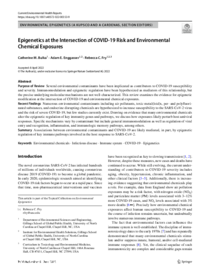Epigenetics at the intersection of COVID-19 risk and environmental chemical exposures

Bulka, Catherine M. ; Enggasser, Adam E. ; Fry, Rebecca C.
Current Environmental Health Reports
2022
epidemic disease ; chemicals ; exposure ; immunisation ; genetics
Chemicals
https://doi.org/10.1007/s40572-022-00353-9
English
Bibliogr.
"Several environmental contaminants have been implicated as contributors to COVID-19 susceptibility and severity. Immunomodulation and epigenetic regulation have been hypothesized as mediators of this relationship, but the precise underlying molecular mechanisms are not well-characterized. This review examines the evidence for epigenetic modification at the intersection of COVID-19 and environmental chemical exposures.
Recent Findings
Numerous environmental contaminants including air pollutants, toxic metal(loid)s, per- and polyfluorinated substances, and endocrine disrupting chemicals are hypothesized to increase susceptibility to the SARS-CoV-2 virus and the risk of severe COVID-19, but few studies currently exist. Drawing on evidence that many environmental chemicals alter the epigenetic regulation of key immunity genes and pathways, we discuss how exposures likely perturb host antiviral responses. Specific mechanisms vary by contaminant but include general immunomodulation as well as regulation of viral entry and recognition, inflammation, and immunologic memory pathways, among others."
Digital
The ETUI is co-funded by the European Union. Views and opinions expressed are however those of the author(s) only and do not necessarily reflect those of the European Union or the ETUI.